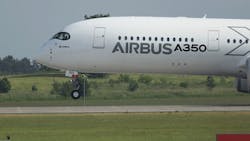Expansion of Airbus Fraud Probe Increases Scrutiny of Middlemen
French authorities joined the U.K. in a corruption probe of Airbus Group SE (IW 1000/44) centered on allegations of fraudulent practices related to selling planes and arranging aircraft financing.
The probe by the Parquet National Financier follows steps by the U.K.’s Serious Fraud Office in August to look into possible fraud, bribery and corruption in Airbus’s civil aviation business related to third-party consultants, the company said. The two authorities will coordinate with one another, Airbus said.
Airbus, which is cooperating fully, has said it dropped the questionable middlemen and expects suspended financing guarantees to be restored. The investigations, which may last for years, add to its challenges as the Toulouse, France-based company tries to expand overseas and counter slowing demand for new planes. An unfavorable outcome could also damage its reputation and lead to significant fines.
The company’s American depositary receipts declined 1.5% to close at $18.61 in New York on Thursday. The Paris stock closed at 70.36 euros Thursday, 38% higher than before the planemaker revealed the inquiry on Aug. 7.
Third Party Disclosures
Last year, Airbus flagged to U.K. regulators and the European Export Credit Agencies “misstatements and omissions” involving outside contractors in some export financing applications, which it found through an internal probe. Credit agencies, including U.K. Export Finance, suspended some of the backstop financing that the company uses to help sell commercial aircraft. Airbus’s failure to disclose the use of third parties was one of the factors in the U.K.’s inquiry.
The U.K. credit agency is one of several in Europe that have provided financing for the company’s overseas sales. Airbus builds wings in the U.K. and assembles aircraft in countries including France and Germany.
Airbus isn’t the only company that has been tripped up attempting to manage growth in the Middle East, Asia and other fast-growing regions. Companies often use intermediaries with local connections to help establish a presence in new markets, where setting up local offices can take years. The practice isn’t illegal, but it can complicate oversight.
Jet-engine maker Rolls-Royce Holdings Plc was under investigation for years after acknowledging possible corruption related to the use of foreign consultants. The company in January of this year agreed to pay about $800 million to resolve probes and admitted paying bribes to win contracts in countries such as Thailand, Angola and Iraq.
By Richard Clough
About the Author
Bloomberg
Licensed content from Bloomberg, copyright 2016.
